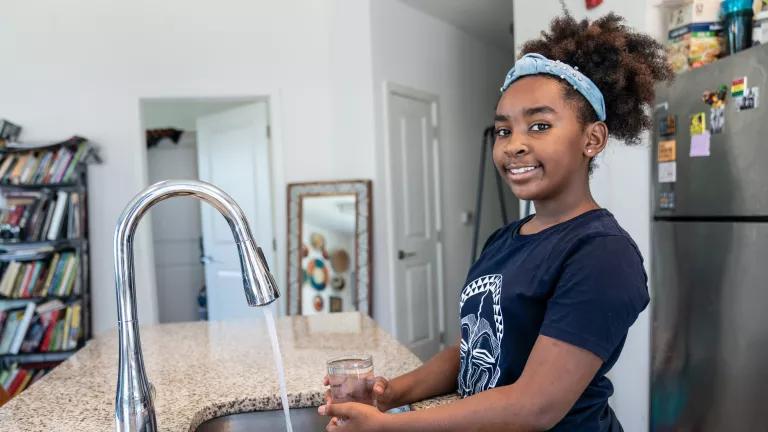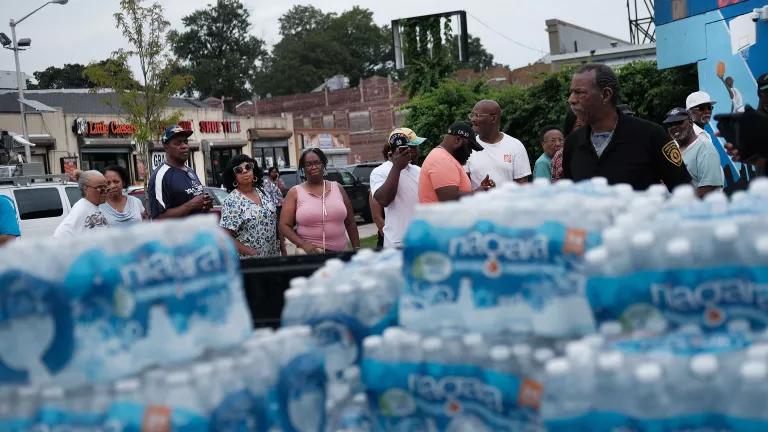MI Governor Leads the Way with Water Reconnection Order
For weeks, the Centers for Disease Control and Prevention sounded the alarm telling us that handwashing is the number one thing we can do to prevent the spread of COVID-19. But as thousands of Michiganders know, you can’t wash your hands without running water.
On March 28, Michigan Governor Gretchen Whitmer became the first—and as of today—only Governor to ensure running water will be restored to all occupied households served by public water systems across an entire state. Executive Order 2020-28 also made up to $2 million available to fund reconnections in households needing plumbing repairs. These repairs are often needed due to the damage caused by their water utilities’ shutoff policies, which result in stagnant water remaining in the pipes and water heaters for extended periods of time. Without these plumbing repairs, the water service could not be safely restored.
Since late February, NRDC has worked nonstop in support of the People’s Water Board Coalition and its partners’ calls for the safe restoration of water services for all occupied homes in Michigan, and the establishment of emergency water stations for cooking and drinking water while homes await reconnection and, after reconnection, until the tap water is safe.
“…Through the Freedom of Information Act, Bridge obtained records from Detroit indicating that 9,500 occupied homes disconnected for nonpayment in 2019 still were without service in mid-January, while the average duration of disconnections for homes with restored service was 29 days…”
Residents in Detroit and Flint have been especially hard hit with water shutoffs, which are almost always due to unaffordable water bills. In February 2020, Bridge Magazine estimated that 9,500 households in Detroit and 5,000 households in Flint lack running water. Further, in fiscal year 2018 alone, the City of Flint shut off the water to more than 7,615 households due to nonpayment and generated nearly $600,000 by charging $75 per home in termination fees for those who could not afford their water bills. It’s worth noting that Flint has among the highest water bills in the United States, nearly double the national average.
Executive Order 2020-28 requires water utilities to provide the details of their efforts to reconnect all occupied homes in a report, which is due no later than April 12. The report will be submitted by all public water supplies that have used water shutoffs as a remedy for non-payment within the last year. These water systems must provide an account of:
- their efforts to determine which occupied residences do not have running water;
- the number of occupied residences without running water as a result of a shutoff due to non-payment; and
- the number of occupied residences without running water as a result of any reason other than non-payment.
In the report, the water utilities must also certify that:
- their best efforts have been exercised to determine which occupied residences do not have water service;
- to the best of their efforts, no occupied residences have their water service shut off due to non-payment;
- the public water supply has reconnected water service for all occupied residences that can be reconnected without creating a risk to public health through accidental connection of the non-potable systems to drinking water systems; and
- the public water supply has exercised best efforts to remedy the conditions that prevent reconnection due to a risk to public health as noted above.
In preparation for the April 12 reporting deadline, NRDC will continue working with the People’s Water Board Coalition partners, Flint Rising, and other groups to gather critical data and prepare questions to better ensure the public water system reports are properly evaluated by state officials. Public water systems should be doing everything possible to ensure that residents in their service area have running water during this pandemic.
One remaining problem NRDC is helping address is that in cities like Detroit and Flint that have relied heavily on water shutoffs, it is going to take a while before safe drinking water is restored to all occupied homes. Consequently, it’s critical that safe water be made available to these residents for drinking and cooking by providing water in containers derived from municipal water systems or through “water buffalos,” which are large tanks of safe water from which residents can obtain water in containers. Although the state Emergency Operations Center (EOC) has delegated water distribution responsibilities to local governments, the systems are not yet in place for residents to access this water.
When this crisis recedes, we will continue working with our local partners to overcome water affordability barriers by advancing income-based water bills, water utility accountability and oversight, and other measures that will help ensure everyone has access to safe, sufficient, and affordable water. As we can see from the COVID-19 crisis, access to safe, affordable water to meet basic human needs is an imperative and a human right—one that should not depend on whether you can afford it.



